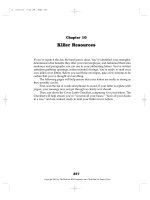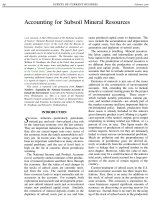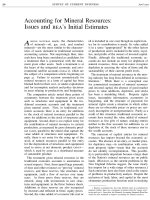Bavi mineral resources
Bạn đang xem bản rút gọn của tài liệu. Xem và tải ngay bản đầy đủ của tài liệu tại đây (2.98 MB, 21 trang )
Bavi Mineral Resources
Chú giải
á biến chất Tiền Cambri
á tuổi Mezozôi: á hệ tầng
Sông Bôi (T2-3 Sb)
á trầm tích tuổi Kainozôi:
đá tuổi Neogen tầng Vĩnh
Bảo, các tầng trầm tích đệ
tứ
á tuổi Mezozôi: á phun
trào axit hệ tầng Viên Nam
tuổi Triat (T1vn2)
á tuổi Peleozôi
Vùng vận động phân dị
kiến tạo hiện đại, cờng độ
yếu, địa hinh đồi thoải,
đồng đẳng cao, phân cắt
yếu
á tuổi Mezozôi: á phun
trào axit hệ tầng Viên Nam
tuổi Triat (T1vn1)
Các tuyến khảo sát thực
địa
Cốt 1300
Tầng cuội kết - hệ tầng Tân Lạc
Đá phun trào bazan T2Vn2
Đứt
gãy
sông
Đà
Đứt
gãy
sông
Hồng
Cốt 400
Đá phun trào T2Vn1
Đá biến chất Pr3Tk
Đá biến chất Pr1Nv
Đá cacbonat C-P bd
GEOLOGICAL PROFILE SON TAY – MINH QUANG
Definitions
• M.R. is a natural accumulation of chemical elements in
the Earth cover, that economically exploited by Human
for their use
• There are three kind:
Mineral resource point
Mineral resource mine
Mineral resource field
• Mineral resource divides to group:
Metallic M.R.
Nonmetallic M.R.
Mineral water
Metallic Mineral resource in Ba Vi
1. Gold (Au): Xoan village, Van Hoa commune
2. Cupper (Cu), 265 cot on the way to Den Thuong
Nonmetallic Mineral resource in Ba Vi
1.
2.
3.
4.
5.
6.
7.
Pyrite in Minh Quang and Ba Trai mines
Kaolin clay in Den Va and Tru Mat mines
Asbestos in Quyt vilage
Limestone in Che mine
Pozzolan in Thanh My commune
Laterite every where
Mineral water in Thuan My and Tan Linh communes
Pyrite
• The mineral pyrite, or iron pyrite, is an iron sulfide with
the formula FeS2. This mineral's metallic luster and pale brassyellow hue have earned it the nickname fool's gold because of
its superficial resemblance to Gold
• In the 15th century, such leaching began to replace the burning
of sulfur as a source of sulfuric acid. By the 19th century, it
had become the dominant method
Pyrite
• Sulfate released from decomposing pyrite combines with water,
producing sulfuric acid, leading to acid rock drainage and
potentially acid rain.
• Iron pyrite exposed to air and water decomposes into iron
oxides and sulfate. This process is hastened by the action of
Acidithiobacillus bacteria which oxidize the pyrite to produce
ferrous iron and sulfate
• FeS2 + O2 + H2O → FeOOH + H2SO4 + Fe2O3
•
•
Pirit
Limonit
Hematit
4FeS2 + 11O2 + 6H2O → 4Fe(OH)3 + 8SO2
2SO2 + O2 + 2H2O → 2H2SO4
Fe(OH)3 → FeOOH + H2O
Minh Quang Pyrite mine
Kaolin clay
• In nature, clay is an assemblage of layer-form silicates, forming
by two main processes are weathering and sedimentation. Layer
structure of clay mineral is formed by basic structure units which
are octahedron layers Al: [AlO4(OH)2 and tetrahedron layers Si:
[SiO4]
• The formation process of Sialic weathering crust and bodies of
Kaolin minerals from solid rocks is acid extrusive rock expressed
by the following chemical reactions:
•
2KAlSi3O8 + 2H+ + 9H2O → Al2Si2O5(OH)4 + 4H4SiO4 + 2K+. Octocla
Kaolinit
Silicat tan
2NaAlSi3O8 + 2H+ + 9H2O → Al2Si2O5(OH)4 + 4H4SiO4 + 2Na+. Anbit
Kaolinit
Kaolin clay
Asbestos
• This is a set of silicate threads belonging to two mineral groups Pyroxene
and Amphibole.
• Crystal structure of the first group has mono-vein silicate [Si2O5] and
the second group has bi-vein silicate [Si4O10]. These veins decide the
length of threads and the high durability of asbestos. they normally
devide into 2 types: Chrysotile Asbestos and Amphibole Asbestos.
• Asbestos is a very good material for insulating, heat-insulation, and
soundproof and very stable under the impacts of mechanics, chemistry,
so it is often used as insulated materials for electric equipments, anti-fire
materials, and additive substances in roof shingle production.
• Asbestos is a dangerous carcinogen substance, so using and exploiting
tendency is decreasing recently.
Asbestos
Asbestos
• The U.S. asbestos industry began in 1858 when fibrous
anthophyllite was mined for use as asbestos insulation by the
Johns Company, New York.
• Asbestos became more widespread during the industrial
revolution; in 1866 it was used as insulation in the U.S. and
Canada
• Amphiboles
including amosite (brown
asbestos)
and crosidolite (blue asbestos) were formerly used in many
products until the early 1980s. Tremolite asbestos constituted a
contaminant of many if not all naturally occurring chrysotile
deposits. The use of all types of asbestos in the amphibole group
was banned in much of the Western world by the mid -1980s, and
in Japan by 1995
Abestos
• Asbestos mineral of the Ba Vi National Park has been discovered in the fault
zone along Xom Quyt – Gia De mountain. Here in 1986, Hanoi Geological
Party studied and explored one ore point in Gia De mountain with reserve of
5.000 tons. Xom Quyt ore point was discovered and exploited by local people
in 2000s. About the origin, Asbestos is a product of metamorphic exchange of
magma and carbonate rocks. Asbestos mineral points in Ba Vi may have been
made by metamorphic exchange of Ban Diet C-P bd limestone system (exposed
in Nui Che, Khanh Thuong Commune) and extrusive rock T1Vn1.
•
• Xom Quyt asbestos formation reaction by limestone changing under the
impacts of SiO2-containing heat fluid from extrusive rock can be illustrated by
following chemical reaction diagram:
•
• 3MgCa(CO3)2 + 2SiO2 + 2H2O = Ca2Mg5Si8O22(OH)2
•
X.
rays partern of Asbestos mineral collected in Xom Quyt exploitation site is
sowing in the Figer 15 can be determine as Tremolite – Amphibole mineral.
Pozzolan
• Pozzolan is a natural mineral – a product of volcanic ash and
volcanic rocks, assembled in the area near operating area of
volcanos. The main compositions of Pozzolan are silicate
minerals containing free SiO2, Al2O3 oxides. When mixing with
quicklime (CaO), additives, water, free SiO2 and Al2O3 in
Pozzolan will clot to form silicate minerals as following
reactions:
SiO2 + CaO + H2O → CaSi2O5.nH2O
Al2O3 + CaO + H2O → 4 CaO.Al2O3.nH2O
• New hydrated Calcium-Silicate minerals will clot additives in
mixing materials to harden to form bricks
Laterite
Mineral water
• There are two “real” mineral water sources: Thuan My
Commune and Tan Linh Commune (Tan Vien Source).
Ord
1
2
3
4
5
6
7
8
9
10
11
12
13
14
15
16
17
18
19
Composition
pH
Sulfate
Bicacbonate
Chlorine
Calcium
Magnesium
Sodium
Potassium
ΣSulfur
Bromide
Fluorine
H2SiO3
Nitrate
SO3
Manganese
Copper
Zinc
Total Radium
Total α
La Phu, Thanh Thuy
Dry season Wet season Between 2
day
day
seasons
7,9
4,3
18,7
14,6
6,4
17,0
14,9
16,9
31,0
24,2
33,9
4,8
45,1
20,4
17,6
35,6
39,9
13,2
14,6
7,8
3,5
12,9
16,9
6,0
14,9
16,9
14,9
23,1
18,2
14,5
10,8
29,3
23,5
22,0
31,2
29,4
14,7
17,7
+0,4
+1,7
-0,3
-3,0
+2,9
+1,0
-2,4
-0,9
+7,1
-16,0
-15,4
+1,8
+18,3
-11,1
+ 12,5
+ 57,1
-25
+5,4
+2,7
Thuan My, Ba Vi
Dry season Wet season
day
day
8,7
7,4
10,6
11,7
7,6
9,9
11,5
8,1
10,6
12,1
8,1
11,2
14,7
17,8
11,1
18,5
7,3
8,8
9,5
7,3
7,8
7,1
10,1
7,4
20,3
8,6
12,4
7,1
32,0
35,1
12,4
10,5
Between 2
seasons
+2,8
+7,2
-0,3
+1,2
+8,9
+1,7
+5,5
-0,3
-17,6
-5,6
+ 27,8
+10,7
+11,1
-39,1
-58,8
+ 28,6
+10,8
Mineral water
• There are two “real” mineral water sources: Thuan My
Commune and Tan Linh Commune (Tan Vien Source).









